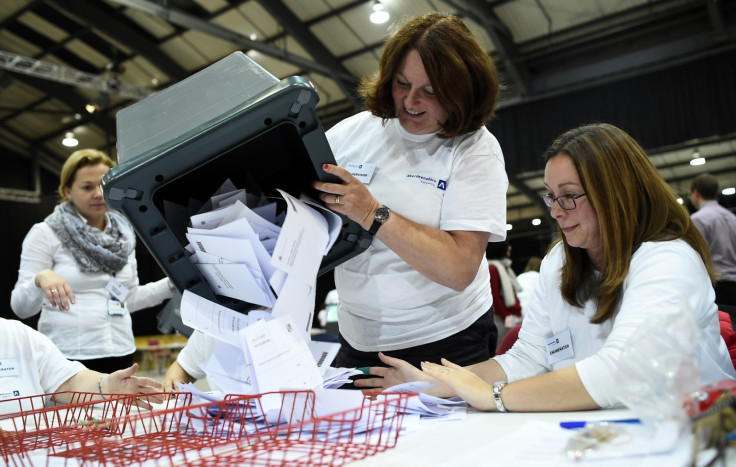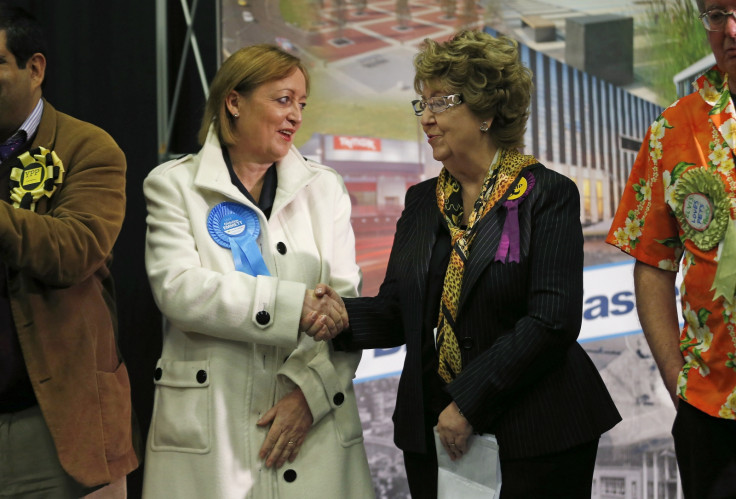Election 2015: What is it like to be a vote counter on election night?

Democracy is tedious; or at least certainly seems tedious after you've been counting ballot slips for hours and hours on end. At the last election I signed up to be a ballot counter, partly because the political nerd in me wanted to see democracy in action, but mainly because I needed the money.
Pocketing £150 ($228) to sit and count a few sheets of paper sounded like a pretty sweet gig and it's not even the most lucrative job during an election. The most coveted job is that of a polling clerk, who for the sacrifice of sitting in a polling booth and handing out ballot papers all day, can expect a tidy sum of £500 or more.
The only problem is that becoming part of this election inner circle is a bit like trying to become a freemason. You have to have the right connections. Luckily, with a parent working for the local council, I had an entry point into what I thought would be an easy payday.
I could not be more wrong. Upon arrival I expected the task at hand to take approximately six hours. It would not be until 13 hours later that I would finally leave the hall exhausted and bleary-eyed.
An old-fashioned system
What strikes you on first impressions is just how archaic the whole voting system is. Each counter is lined up along row after row of tables. Then the big black ballot boxes are wheeled out, unlocked and unceremoniously tipped out in front of you.
An election hall is a bureaucratic madhouse that is anarchic, repetitive and really, really boring.
With the aid of a thimble, you then begin counting up a total of all the votes cast in your chosen constituency, before the next stage, breaking those votes down into exactly who voted for who. This is done in an even more crude way, by placing the votes of each party down into their respective trays, like the ones you used to have at primary school. Then the final count begins, where you tally up each tray, make sure the numbers correlate with the total votes cast (including those pesky spoiled ballots) and declare a winner.
The opportunity for human error means that it was no surprise when the figures didn't add up, causing the large group of us to go through all the ballots again until the numbers finally made sense. What was even worse was that the result was deemed by the candidates too close to call (there were less than 1,000 votes in it) and so a recount was ordered.

Intimidating candidates
The task isn't made any easier by the candidates themselves. You're not allowed by law to intimidate candidates when they vote, but for some strange reason it's deemed perfectly acceptable for them to intimidate vote counters.
And they will try every trick in the book. I had one candidate tell me to keep my elbows off the tables as I might be trying to conceal ballot papers, another telling me to mark them upside down so that they could clearly see where the tick had marked and another who argued with me that one of the spoiled ballots should go in their pile (their party and another had both been ticked, thus rendering it void).
We had been warned beforehand that the candidates might try this, but their desperate and ultimately futile tactics do disrupt the process and delay the result.
I can see why they do it. For me it was just an interesting experience, a novelty job. For them, it's their careers, indeed their lives. They've been campaigning for months if not years to be their constituencies' local representative and now know that a few thousand sheets of paper is what stands between them and glory.

And the winner is...
They've been campaigning for months if not years to be the constituencies local representative and now know that a few thousand sheets of paper is what stands between them and glory.
When the emotional rollercoaster is finally brought to an end and the results are announced you can see how much it means to each candidate on their faces. The winner in my case burst into tears of joy as their colleagues clambered around them.
The other candidates ranged from relieved to despondent, with the one who finished second sitting down and reading over the results, desperately trying to make sense of the numbers that had let them down.
It was an exhausting experience, but one that I'm glad to have taken part in. As one of the defeated candidates who had sympathy for our plight admitted to me afterwards, it was high-time the UK embraced electronic voting.
Already embraced by the US, Brazil, Belgium, Estonia, the Philippines and India, it makes sense that e-voting will one day be adopted here as well. Less susceptible to error and immune to intimidation, using computers would speed up the process immeasurably and cut down on the approximately £150m the UK spends each year running elections.
But it will also be a shame when this rough and ready form of democracy is done away with. When later tonight when you're either blissfully asleep or up all night at an election party, please spare a thought for the poor souls that will be slavishly totalling up your votes – all in the name of democracy.
© Copyright IBTimes 2025. All rights reserved.






















